
Vol. II No. 16 BENGAL AIR DEPOT MARCH 24th, 1945
TEST BLOCK DIN HELPS US WIN
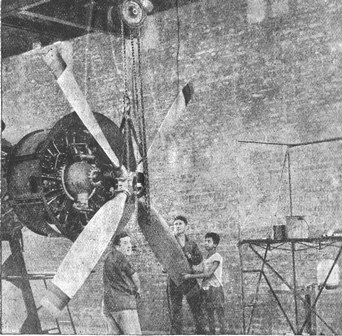 Sgt. Morris Kansagor and Pfc. John Wood perform the delicate and precise job of installing a prop on an engine preparatory to a test run.
Sgt. Morris Kansagor and Pfc. John Wood perform the delicate and precise job of installing a prop on an engine preparatory to a test run.
|
Specialists and Technicians Comprise Many Phases of Aero Engine Test
One of the most important departments in this theater is the Test Block Department located on this Depot. Impatient or "nervous in the service" GIs sometimes protest against the noise that comes resounding across the base as engines are given their "exercise" on these blocks... vital tests to break engines in for flight operations and to find defects if any, in engines which will someday be over the Jap in China or Japan itself.
Engines come into the Depot for overhaul from the various using organizations in the theater. of course they are first handled by Engine Repair from where they are sent to the blocks. Here they are mounted on the blocks and connected with the test cell, put into operation and given every strain and speed which would be present in an actual airplane. The RPM is increased every half hour at normal rate (cruising power) and is then increased to full power for ten minutes.
the interior of the test cell is similar to the cockpit of the plane with an instrument board and window facing the engine. The operator is present all the time that an engine is running and he watches over it like a hawk noting every detail. On a form made for the purpose he makes time reports from his instruments, recording the RPM, oil pressure, oil in and out temperature, cylinder head temperature, manifold pressure, fuel pressure and oil and fuel consumption per hour. Superintendent of engine test is M/Sgt. Henry J. Willimsen of Grand Rapids, Mich. The Master really means something here because this boy is just that when it comes to engines. He has been in India fourteen months.
Foreman at the blocks is T/Sgt. Junior H. Johnson of Atchison, Kansas, also a fourteen month IB Theater veteran. In addition to his technical aptitude this boy is also an all around athlete excelling at football, basketball and track. Another test block foreman is S/Sgt. Lyle K. Glasgow of San Diego, Calif. Lyle, a specialist in some phases of engine overhaul, has been here 18 months. He is a former employee of the Solar Aircraft Co.
Ever patient and ever alert are the boys who sit and observe hour upon hour the functions of the engine. Pfc. Carl V. Smith of Montour Falls, N.Y., 15 month man, is always right on the beam. Bennetsburg, New York's Pfc. Robert L. Kaufman is an excellent engine diagnostician. A schooled electrician, Bob spends his leisure hours dreaming about the day when he can return to that little gal who has been wearing his ring for two years now. Young Pfc. Robet J. DeMott of Pattersonville, N.Y. has been over here 18 months and is doing a splendid job as an operator. Veteran Pfc. Franklin Schichart of Marinette, Wisconsin is one of the outstanding operators on the job. Cpl. Joseph H. Gwynn of Mentone, Calif. has been over here eighteen months. Joe worked on the construction gang and later became an operator. Cecil E. Osborn, a Pfc. from Eureka, Ill., is a consistent fellow who is also quite versatile. He is a former glider pilot trainee in the army and in civilian life attended Illinois State Normal U where he excelled at all sports.
S/Sgt. George Zrelock of Freeland, Penn. is a specialist at test block operation. He has been in India for nineteen months. An excellent observer at the cells is Pfc. John Vern Olson of Lincoln, Nebraska who has been in India for 16 months. A former Wright Aero engine tester Cpl. George M. Herzig of Hamilton, Ohio is now using his talents in the field for the army. The corporal is a graduate of the Butler County Business College where he was known as quite a golfer.
Expert engine test man Sgt. Michael R. Lally of Newton, Mass. lists his civilian occupation as "husband." Sgt. William T. Biall of Sandy Spring, Md. got his first experience with engines as the manager of a service station back in the pre-Army days. Sgt. Andrew Mares of Astoria, Long Island, N.Y., expert test block operator has been in India fifteen months and with the rest of his contemporaries is doing a splendid job.
Chief of production control at the engine test is T/Sgt. William J. Spangler of Indianapolis. Bill was a mechanic in civilian life and attended the Curtiss Wright aero scool in the army. Cpl. Gerald F. Dunne of Brooklyn is the chief clerk at Engine Test. He has been in India for fourteen months.
Defects, of course, are found in some engines and whenever possible repairs are made by the maintenance and repair crew of airplane engine mechanics and specialists who work out of what they call the Test Block Hospital. S/Sgt Quentin R. Beall of Elyria, Ohio knows his engines like a baby specialist. A former Republic Steel employee, Beall is the rookie of rookies at the test block, having just recently completed his first month in India. In reverse we have the veteran Sgt. Dale Colson of Boise, Idaho, former crew chief on Gen. Hackett's plane. This technical expert has been in India for nineteen months. From Mendian, Miss. comes specialist Pfc. Sam Morgan who has spent a year in India. before entering the service Sam, worked for a year and a half as an engine mechanic at an AAF field in Mobile, Ala. Sam's partner in many jobs is Pfc. Henry N. Waters who has spent a year in the theater.
How long in India? "Nineteen months and six days," says Sgt. Delwin Clint Crum of Milan, Mo. Crum, who was a farmer in civilian life, is apparently counting the days until his return. In the meanwhile though he is building an enviable record. Pfc. Raymond L. Fisher of Wilkes-Barre, Penn. has spent ten months in India as well as some time in North Africa. He is considered tops in his line.
Hospital crewman Pfc. M. A. Thompson hails from Bushong, Kansas. We can't say we have ever heard of the place but it certainly sent a good man into airplane engine work. Thompson has spent fifteen months overseas in India and North Africa. Warren G. harding (no relation) is a sergeant who comes from Swanton, Ohio. A former engine mechanic for Ford Motors, now foreman of the hospital crew, he has for the past fifteen months been showing the GIs in India a few tricks of the trade. From the famous boom town of Bakersfield, Calif. comes Cpl. Louis C. Nelson. He is also a civilian aircraft engine mechanic and really knows his business. Nelso has spent seventeen months in India.
S/Sgt. Arthur Pate, jr. is one of the favorite sons of Cary, N.C. he was an auto mechanic before the war and after being called to service switched to airplanes. He has been doing superb work over here for nineteen months.
Inspection is one of the big departments at the test blocks. During and after the run is completed the inspection department takes over. They combine all data and take the engine itself and give a fine going over. All operations and reactions are tested according to technical order requirements. All individual parts are thoroughly inspected as well as the fuel used.
The inspection section also supervises the installation of the engine, and follows previous data about the engine in watching for various reactions. Inspectors make a check after every hour of running. The engine is stopped and gone over thoroughly piece by piece.
It is possible for the engine to function perfectly and still have something wrong, hence a screen test is given. By this is meant that the oil screens are checked for metal particles to determine if the engine has internal failure. The absolute necessity of having expert men do the inspecting is quite obvious... ask the pilots who sit behind these engines. Sgt. Philip Hertz of Cleveland is the chief inspector for engine test. The sergeant confers with the boss, Lt. Skodack, about the functioning of all engines. Hertz has been in India for 18 months. He attended Cleveland College and before entering the service was a fashion promotion and sales representative for a dress firm.
Foreman of the test block inspection is Sgt. George E. Ryan, Jr. of Springfield, Mass. A former employee of the New England Telephone and telegraph, Ryan has been in the army for two and a half years, 18 months of which have been spent in India. Sgt. Seymour Cohen is a highly thought of inspectore. He is from the Bronx where he attended the City College of New York. As a civilian Cohen worked for the Still department at Warner Bros. Cpl. Richard E. Jones of Long Beach, Calif., has had a great deal of experience with engines. For two and a half years he worked on the line at Patterson Field, Ohio and has now completed his eighth month in India.
Pfc. Donald D. Sams of Charleston, S.C. was schooled by the army for inspection work. he has been in India for 12 months and has also spent some time in North Africa.
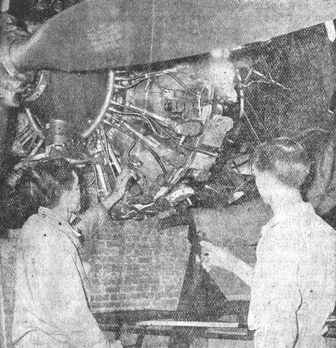 Cpl. Walter Ullrich and Pfc. John V. Olson of the Test Block Department prepare an engine for a run.
Cpl. Walter Ullrich and Pfc. John V. Olson of the Test Block Department prepare an engine for a run.
|
The test blocks also have their own maintenance shop that handles all jobs that are not serious enough to be sent to Engine Repair at the Shop. This very efficient shop maintained by specialists turns out an amazing amount of work. All electrical work such as starters and preparing wiring for the cells is done here. Instruments which must be accurate to the nth degree are checked in the shop. A great deal of welding is also done. Engine mounts are rebuilt and shrouds for the cooling of engines are made right here. T/Sgt. Frank H. Fuerneisen of Camden, N.J. is one of the veterans in this shop. A welder as a civilian Frank has been in India for 15 months. He states most emphatically "I want to go home."
From the wide open spaces of the west comes Pfc. Frank A. Pleskac of Havre, Mont. A farmer and a rancher Frank finds these parts rather crowded but does a splendid job in his section nevertheless. S/Sgt. Henry C. Wolcott of Batavia, N.Y. is another lad who was a welder in civilian life who is utilizing his talents over here. He has been in India for 18 months now. A former football and basketball star at Trinidad State Junior College in his home town of Trinidad, Colorado is Sgt. John H. Bailey, one of the section's most efficient maintenance men. He has served 15 months in India. Cpl. Russell E. Fetterman of Paterson, N.J. really helps this air war in CBI along with his complete technical knowledge. He is a former machine operator who followed similar work in the army.
The test cells themselves, aside from the engine work, require a tremendous amount of attention because, as is obvious, a poor test cell means an inaccurate engine test. The very nature of the work creates a tremendous strain on electrical connections, instruments and the highly complex system that comprises a test cell. Usually, for caution, all parts must be replaced and checked before they are used again. This includes even the wires and lines leading to the engine. The men who work on this job must be versatile in their technical knowledge. An excellent flaw discoverer is S/Sgt. George A. Mueller of Queens Village, N.Y. who has been doing this work here for over 15 months. Sgt. Frank A. Urbanski of Wakefield, Mass. has attended two aviation engine schools in the army. He has been over here 19 months and is considered a key man. Los Angeles' S/Sgt. William A. Margrave was a test block operator for the U.S. Civil Service before entering the service. This technician has been overseas teaching others many new tricks for 18 months.
Veteran of the entire Test Block group is Cpl. Albert H. Mertz with 22 months' overseas time already to his credit. hard work isn't all that this GI is sweating about. Fifteen months ago S/Sgt. Aloysius J. Gilson came over here and the haddon Heights, N.J. four striper has been going like a house on fire ever since. Cpl. James A. Taylor is the lad they call on when they get stuck on some problem or another. He worked for Wright Aeronautical as a civilian and has now totaled 19 months here. Chicago gave the theater S/Sgt. harry E. Samuelson, a very hard working man since his arrival overseas 15 months ago. Sgt. John T. readyhough of St. Louis was a foreman in a life raft company as a civilian but the army made an excellent power plant man out of him. He has spent 3 months in North Africa and 13 months in India.
Cpl. Frederick E. Johnson of Seaford, Long Island owned a boat house before raising his right arm. 18 months flys by over here when you work as hard as Johnson does.
When they play the "Jersey Bounce" Cpl. Anthony B. DeVrancisco's ears perk up because he is a native of that state, originating from Hammonton, N.J. Tony has spent 18 months in India and previous to enlisting was employed by the Philadelphia Navy Yard. Buffalo, N.Y. and the Linde Air Products Co. sent Cpl. Harold W. DeGlopper to us. He has been over here 14 months doing a splendid job. Former Bell Aircraft man is Cpl. Edward Hojnacki of Angola, N.Y. who has been a Power Plant Specialist here for nearly 15 months. Another is William R. Hatch of Milwaukee, Wisc. Sgt. Frank J. Anthonis came to the army from the Ford Motor Co. and has served both in Africa and India.
Cpl. W. F. Ullrich is from Los Angeles and has been turning out record breaking work for 15 months. Sgt. Philip Jones is from Sierra Madra, Calif., and was an aircraft mechanic as a civilian. He is a comparitive rookie having just completed his eighth month here. Former Curtiss Wright prop man is Pfc. John S. Ricker who has been examining and fixing power plants here for over a year. Pfc. Cecil E. Dodrill of Logansport, Ind. is considered one of the best diagnosticians of power trouble on the base. Pfc. Condy G. Billingsley of Farrvell, Texas has been here over 14 months and has done some amazing jobs. Pfc. Gerald Austin, ax ex-farmer of Peterson, Iowa has been here for 16 months and his associates will tell you that there is always an answer to a sticking power problem when he is around.
Pfc. Thomas C. Karr of the Capitol city of Washington, D.C. has been in India over a year having served in Africa previous to coming here.
One of the other big projects at the test block is Construction. The department builds all their own blocks, roads and buildings and it is still incomplete. Sgt. Melvin E. Deal is in charge of construction and his genius has brought about model layout. He is from Salem, N.J. and has been in India for 18 months.
Other jobs necessary for the function of the Test Block Department are the individual tasks performed by Cpl. Ellsworth C. Klehm of Harrison, N.J. who has been the stock-chaser for the Engine Test Branch for 13 months. He was also in Africa for 5 months. Shipping and Receiving at Engine test is handled by Pfc. Nickols of Putnam, Conn. a 16 month veteran of the theater. Pfc. Julian Cooper of Birmingham, Ala. is also doing special work of a secret nature. Truck drivers handling delicate items such as gas, oil and the engines themselves are Stanley R. Weiss of Cohoes, N.Y. who has been here now for the unheard of length of time of two and a half weeks and his veteran partner Robert W. Farnell of Rochester, Wash. who has spent 17 months in the theater.
Also a part of the Test Block Department is its prop shop which we covered in a feature last January.
Boss of the entire test Block Department is Lt. William Skodock of Muskegon Heights, Mich. a former Continental Aircraft engineer. Skodock is an officer who will get right in there and pitch in with his men. He is patient and takes time to teach the rookies some of his great engineering knowledge. In addition he is as proud as a peacock of the men in his department and the excellent work that their record indicates. It is obvious that for this he cannot be blamed!
ATC CHIEF COMMENDS ASC
In a letter to Maj. Gen. George E. Stratemeyer, Commanding General, India Burma Theater, Maj. Gen. H. L. George, Commanding General of the ATC commended the Army Air Forces operating in this theater. The General stated:
"During the past two full months, India-China Division, Air Transport Command, has accomplished the undertaking of transporting more than 40,000 tons in each month from India to China. This, in itself, is an outstanding accomplishment - one in which both the Army Air Forces and the U.S. Army can have justifiable pride.
"The Air Transport Command is, quite naturally, proud of its share of participation in this undertaking. It occupies, due to the nature of its mission, perhaps the 'fron' position od responsibility in this job and to us have come commendations which logically and justifiably should be shared with other in the U.S. Army organization. Principal among these is the Army Air Forces in India-Burma Theater. We depend upon you to represent us with other interested agencies in the theater; we depend upon you for the maintenance of the supply channels which go up the rivers and railroads of India; and we depend upon you to provide for the heavy maintenance requirements of a busy aircraft fleet.
"For the pleasure of serving with you, for the fine spirit of accord, aid and cooperation which we have always had from you and from members of your organization and for the many tangible 'back-up' accomplishemnts of your command, making possible the fulfillment of our basic responsibility, we are indeed grateful to you. I would sincerely appreciate it if you would convey that sense of obligation and appreciation to all members of your organization."
In turn, Gen. Stratemeyer, in a letter to Maj. Gen. Thomas J. Hanley, Jr., Commanding General, Air Service Command, stated in part:
"The major part of this commendation properly belongs to the Air Service Command which, under your leadership, has supplied and maintained the airplanes which the ATC uses to China and has on numerous occasions furnished special services to the ATC in connection with its operations. The cooperation which has existed at all times between your command and the India-China Division, ATC, is worthy of the highest praise.
"In accordance with Gen. George's request it is deasired that the substance of this letter, and of the commendation, be conveyed to all members of your command who have participated in any way in the support of ATC activities in this theater."
That's you, soldier.
|
Roberts Wins ARC Quiz Contest Tuesday night's Quiz Show held in the ARC Club and conducted by Evelyne was won by (you guessed it - privates have all the brains) Pvt. Harold Roberts. Surprisingly enough two Sergeants, Harry Losin and Herbert Crosby, finished second and third respoectively. |
DEPOT SAVINGS RECORD LAUDED
The men of the Bengal Air Depot have received a commendation for the excellent record of savings compiled here since the beginning of the campaign. The amount of savings has been tripled since the beginning, according to Lt. Burton W. Hutchinson, F.D. Savings Promotion Officer.
Lt. Hutchinson and his office did a fine job of promotion on this campaign, and received good results. Savings now will spell profits later for every man on this Depot. If you have any left over cash be sure to deposit it - or better still - arrange for a regular deposit each month to be deducted from your pay.
GREETINGS TO THE NEW MEN
The Tiger Rag wishes to go on record in this our greeting to the new men on the Depot. We welcome you into our midst and hope that your stay here is a pleasant one.
Tiger Rag is your newspaper and we want you to use it. We are trying to make it the best Army newspaper there is and the best paper we know how to publish. For this we need your constant support in giving us any tips which you think may have news value as well as your financial support each month. It will be no easy task to publish a good paper during the coming hot months and we will need all the support that you can give us.
Your stay in India can be rather pleasant in spite of many discomforts. There are perhaps not worse places but there are certainly worse conditions to live under. You can learn much by observing and listening to what goes on about you. You can either go home with many interesting stories about your service in India or you can develop a habit of inertia which would make your stay as profitless as though you were embalmed for the time you spend here.
There are many unpleasant aspects. First is heat which is already bad but which will soon beat you down mercilessly sapping you of vitality and leaving you open to the many little unpleasant maladies of the skin peculiar to a tropical country. It is well to learn not to dissipate your energy and to make use of the salt tablets which are in every mess hall.
Sanitation at the Depot is excellent but unfortunately you will also be at other places where it is not so good. Tropic heat and humidity causes everything to grow fast. Bacteria and disease germs are no exception and it is well always to strive for cleanliness. This leads to another subject, at which we are about to establish a record, that is V.D. It is not a record to be proud of and we should use every means at our disposal to combat it.
Bugs, mosquitoes and dust bring with them diseases such as malaria and cholera. Malaria warnings and precautionary measures aren't just another thing thought up for our discomfort. Talk to the man who has had it
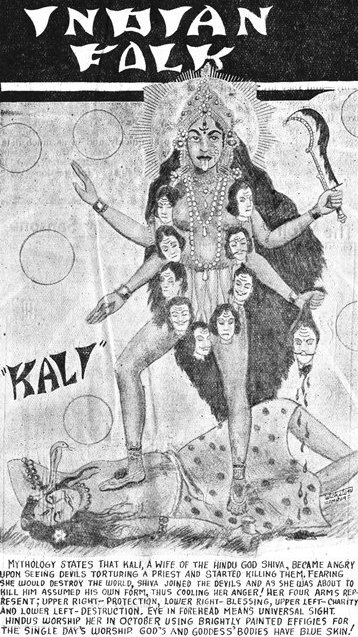
|
Traffic safety requires your complete attention if you drive. Remember, the reactions of these people to speed are not as well developed as ours. They are not used to the high speeds as we are. On the base ground safety is important. We are a large community and a few safety precautions are necessary to efficient operation. In another part of this issue you will see an article on security. In this theater more than in any other it is important that we watch what we say. The Japs like to have us talk carelessly and they are here to listen.
Participate in Depot activities. There is more here than you can ever find in town. Special Services has facilities for all kinds of sports, a library and Tiger Tech which is our special name for classroom USAFI courses. You can continue your education here or learn a new job if you have plans to change your work after you leave the Army. The Post Theater is for your pleasure and shows are booked which are the best available at the moment (we do draw a stinker once in a while).
Rajah's Rest is your club operated by the Red Cross. There is always something to do and we heartily recommend their tours. The chapel and the chaplains are always at your service and we have a well stocked PX which is at your service day and evening. It is as near to an American drug store as anything in India and has almost as many departments.
The medical department here is at your service all the time. It is efficient and the best there is. Remember it is your doctor and your medicine cabinet at the same time. Trivial things are apt to become important and the men there are always willing to serve you whether it be a needle in your arm, a simple laxative or a stay in the infirmary.
All in all we have everything that you need in a community of this size and a lot more than many others have. Each department is doing a fine job to make your life here pleasanter. Use them and we suggest a show of appreciation once in a while. We would like to compliment individuals and introduce them to you but there are too many and they are all doing a bang-up job so we will leave it up to you to meet them and find out for yourself.
We would like to welcome each of you individually too but there are too many of you. We would like to hear stories from back home and we would like to hear your reactions to us and India but we will leave it up to you to get into the swim.
In the meantime we welcome all of you heartily.
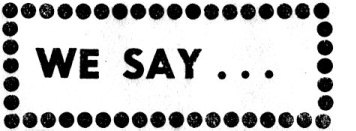
The cool breezes of the evening were beginning to dry the sweaty foreheads of several hundred GIs at the post theater. The sun was setting and a voice was saying something over the loud speaker - something that sounded like a vaudeville routine of the early 30's - "This is not your blah it's your blah blah." Of course that voice has been saying that for ten or fifteen years so it must be good, it says here. Cigarets and pipes were being lit in the fast settling gloom.
A fellow whose hair was neatly clipped a half inch from his scalp was gesticulating to a toussle haired GI beside him on the bench in front of us. He used his hands, facial expressions and twists in his voice to emphasize his words as he told his companion of an incident that had occurred earlier in the week.
This tropically scalped fellow whose name we later learned to be Barney, had driven to town in a jeep. He told about his conversation with a GI he had given a ride to town.
"New here, aren't you?" Barney asked his companion shortly after he had paused at the "thumb post" to pick him up. His keen glance had shown him the comparatively pallid skin and air of curiousity at his surroundings of the GI. The affirmative nod of the short newcomer started Barney off on a series of lectures and dissertations about the wonders of India in general and this particular alley of Bengal in particular.
The jeep shot past an ox cart while the driver's companion stared at a dhobie pounding a white cloth against a stone slab, causing dark colored water to fly in all directions. Barney commented on the different aspects of dhobie laundering while his audience hung on to every word - and the side of the jeep.
Hitting a straightaway with no MPs in sight Barney accelerated the jeep beyong thirty miles an hour. The canvas top shuddered and rattled in the breeze. The one month veteran of the IBT huddled in his seat as the jeep wheeled around plodding ox carts and between frightened cows that wandered leisurely across the highway.
With his eyes on the speedometer and then on the road Barney became philosphic.
"Look at those ox carts," he said with disdain. "They sure travel. They reflect the atmosphere and reactions of the people here - everything so slow and calm and phlegmatic.
"And yet today's civilization depends on speed. The whole theory behind modern warfare revolves about the quick disposition of troops and supplies. The Germans tried to win the war on the basis of the mobility of their forces..."
The sun beat down as though angry at the scene it surveyed. Barney piloted the jeep as though he was part of of it while his companion tried to glimpse the disappearing scenery.
The speedometer needle hovered around 40.
"Yessir, transportation has sure speeded up," Barney smirkingly resumed. "When you think of the changes inventors have brought about - from horses, carts and wagons to trains, trolleys, autos -"
"What comes after autos?" the passenger queried, after Barney had left his sentence incomplete.
Barney was staring into the rear vision mirror at a rapidly growing white jeep. He groaned weakly and slowed.
"MPs!" he answered woefully. - Art Goldberg
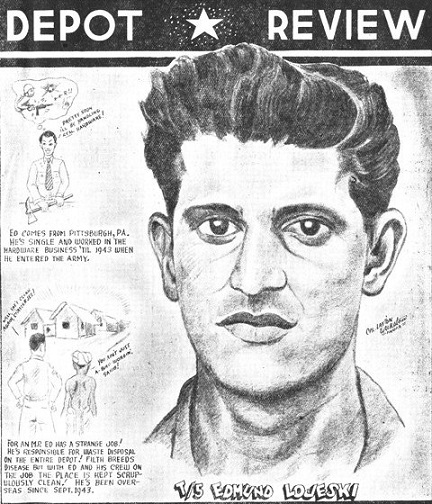
|
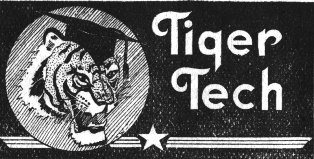
Day after day the men of the field who are interested in educational pursuits come to see us at the Special Service office. It seems that almost every problem offers a different set of questions to be answered. We are rather proud today that the majority are taken care of and most of the men who want some course to take go away from the office with a pretty good idea of what they are to take or how to get information on what they need to do in getting information from their schools.
It seems as though the most difficult thing which all of us are confronted with is the finding out what courses need to be taken in order to get a diploma from the school which we left to enter the Army. Thinking the matter over it is obviously impossible for the army to offer the graduation requirements of every school in the United States. For this reason it is necessary for the individual soldier to contact his school by writing a letter requesting, 1) Information as to whether his school will accept USAFI credits toward graduation (the majority do), and 2) what course offered by USAFI can be taken in the individual case, which upon completion, will be acceptable by the school toward graduation.
Most schools which have been heard from, here on the post, are most cooperative in giving the necessary information. Some recent replies from Stateside high schools sent their former students all the information necessary for completing high school while in the army. They send a complete record of the credits already earned by the individual up to the time of his leaving school.
Often an enclosure is included in the reply which tells the very number of the course to be taken, as listed in the USAFI catalogue itself. Having this catalogue right here in the Special Service office it is an easy matter for us to enroll the GI in a course the very day he gets his school's reply and inside of a week he is studying the very course he needs in order to graduate from the school he formerly attended.
The whole process is as simple as all that and if in the meantime one wants to take a course while waiting for his reply from his high school or college he may select from the wide range of studies offered here locally, and in practically any field.
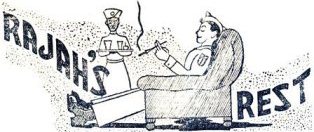
"Millie's Ghost" of a few weeks ago is not in sight (were "ghosts" ever really seen?). My collaborators of last week seem to have done a disappearing act also, so I suppose I will resign myself to the fact that I must do work for and by myself this time.
Helen is spending a week at Puri, escorting some fifty boys to Rest Camp. Do we miss her? You ain't just a kiddin'! As we sit here dripping (I'm sure already that the person who said "good old summertime" wasn't referring to India), we are thinking of her - the sunshine and the beach. We are hoping she has a swell elegant time, but we'll be waiting to welcome her back with open arms.
Have you noticed that "Brooklynite" Cpl. Hal Kirsch, spending a lot of time around Rajah's Rest lately? No fellows, he isn't what is known as a Red Cross Commando, he's assigned to us (thanks to Special Service). If any of you have been bashful about telling "us gals" about your talents, maybe you will make them known to one of your own GIs now. By the way, if any of you readers saw Danny Kaye's "Up In Arms" - Hal saw it also!
That word talent brought forth another thought (it's still sorta' along the talent line anyway). Monday night promises an Amateur Show. Tomorrow, Sunday, is the closing day for entries and be sure to get your name in at the Red Cross office. If you can sing, make fancy steps with the feet, or do anything that you think will entertain, we are looking for just you. If you are the fellow that keeps the barracks in stitches with your witty stories, why not come around? It's fun for all and all for fun.
Two instead of one - that is what we now have in the offerin' (Don't get excited. I'm not going to say anything about American girls.) Yep, there will be two tours - Mondays and Saturdays. For you swimmers, there will be swimming and then a movie at the Village on Mondays. Saturdays are the same as previously - food, dancing, etc. Transportation leaves from the back patio of the Rest at 5:45 pm. Sign your name on the Bulletin Board for either swimming on Monday or dancing on Saturday.
The March birthday list contained thirty-five names. Happy Birthday, fellows. Sunday at 3:00 pm the party for you will be held in the lounge. We hope to see you at the birthday table at that time.
Bridge winners on March 15th were Pvt. Maurice Levy and Pfc. John Wood. The slam winners were Cpl. Fred McBride and Pfc. Grombie. Congratulations and hope you will do it again. In case you have forgotten, Thursdays are card tournament nights always and there is a tournament this week.
Artistic ability not required next Saturday night! A good old-fashioned Easter Egg coloring party is scheduled. Egg dye is on hand, and for those so inclined, we will have brushes and paint for you to really fix up these eggs.
Time and space is running low and I find it is time to say "Salaam." This "drip" is signing off until later. - Mildred
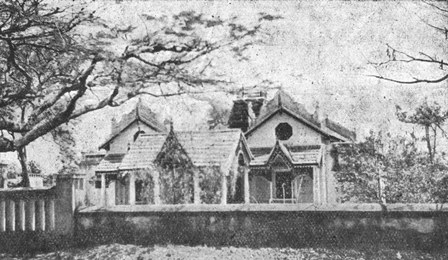 Quaint Swiss architecture predominates among the residences in Bangalore vying for attention with luxuriant tropical flower gardens which boast 500 different varieties of blooms.
Quaint Swiss architecture predominates among the residences in Bangalore vying for attention with luxuriant tropical flower gardens which boast 500 different varieties of blooms.
|
This is the second in a series of articles by Tiger Rag Editor William A. Frank who went out as theater correspondent to the GIs of the Depot. Recently arrived from Southern India, first section of the India-Burma and China theaters to be covered, Frank brings back an interesting story which he has divided into several chapters for your reading pleasure and knowledge.
The plane taxied to a stop in front of the passenger terminal at the air base in Bangalore and in a few minutes we were whisked to the Billeting Office where after being registered we were fed and housed.
The reception was most cordial and after reporting to the adjutant I was directed to Capt. L.E. Little, Public Relations Officer and former newspaper man from the western United States. Capt. Little spent the afternoon helping me with plans to make my stay there as productive as possible, arranging transportation and leads for much information which I needed. Pfc. William A. Moen of Transportation helped greatly to work out train schedules to fit the time alloted for the trip.
Bangalore is a beautiful city in Mysore State. To those who have not been around much it would be a treat indeed. The streets are clean and the quaint Swiss architecture of the homes add to the invigorating climate at an elevation of 3000 feet. Each home has a beautiful tropical flower garden and with Cubbon and Lalbagh Parks add proof to Bangalore's claim of 500 varieties of blooms.
Long a center for British Army cantonements, Bangalore is one of the best places in India for the soldier. Prices are in keeping with the soldier's purse and there is very little begging as well as no cow patties.
The Indian Institute of Science does much research all over Mysore. Educational institutions such as Central College, St. Joseph's, Welesley Intermediate and Maharans College for Women make for progress. State and private industry flourish making Mysore one of the richest states in India. The people here show the results of this wealth. Gay colors and happy faces greet one at every byway. Nearly every woman wears flowers in her hair.
The population numbers over 100,000 and the annual rainfall is 36 inches. Days may be warm but evenings and nights are always cool and comfortable. There is no malaria and city life is very pleasant indeed.
Much hunting may be found for the sportsman. Tiger, bison, leopard and other soft skin game is in abundance. Distances are shortened by excellent railway connections. Mysore City is just 65 miles away by train and while it is the capital many government offices are also to be found in Bangalore.
Hotels serve excellent meals. There are plenty of theaters, dancing at five places almost every night, and restaurants. Besides the above there are five canteens open to service men at all times as well as swimming, boating, roller skating, football, hockey, boxing, golf and billiards.
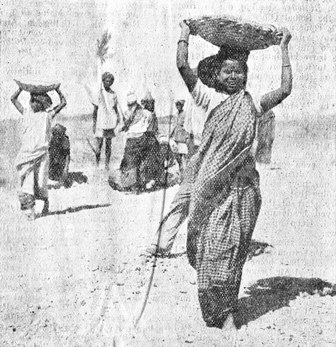 Road building is done the hard way near Bangalore.
Costumes run to gay colors and the wearers are even more colorful.
Much talking further hampers the pre-machine age progress.
Road building is done the hard way near Bangalore.
Costumes run to gay colors and the wearers are even more colorful.
Much talking further hampers the pre-machine age progress.
|
Capt. Little, among other things, procured a bicycle which I used to visit the villages about the base. Curious, smiling faces greeted me from all sides as I went into one of the stone quarries nearby. All of the work was done by hand and crews were laboriously stripping off the hard rock which they broke by hand mauls for use on roadways. Along the roads were gangs consisting mostly of tall, well built women who spread the rock while a steam roller flattened it into a smooth surface. A great deal of talk and harrangue went on as they plodded to and fro from the rock pile with their burdens on their heads but when the camera appeared on the scene they were all ready to pose. Smiles flashed as they entered into competition to get into the picture. I took a number of photographs which you may see at the PX.
A number of large factories such as the Mysore Paper Mills, Mysore Lamp Works, Mysore Paint Works and the Iron Works at Batadravathi were rather primitive, there being no machinery in the place.
Back at the base we gathered together in the transient quarters for a last get-together. I was shoving off in the morning for Mysore and the Flight Leader of a British crew and his boys were wishing me goodbye as the GIs crowded around to wish me well. We talked long into the night. The men were from all over the theater and all on different missions.
Bangalore and its people had been a treat. I was with a grateful feeling that I left Bill Moen at the depot the next morning. He had risen early to see me off as a final gracious gesture and Mysore City lay ahead. First, however, I must cover my trip to the gold fields at Kolar which was a side trip from Bangalore - so next week I will try to give you a picture of a day at a gold mine.
|
Amateur Show at Rajah's Rest
On Monday evening at 8:00 pm an amateur show will be held at Rajah's Rest. Cpl. Hal Kirsch of the Special Service Office will MC the show. Entries are to be in by Sunday night in the Rajah's office. Any act is welcome and all are urged to take advantage of the attractive prizes for the winners. |
Birthday Party At ARC Lounge
Those having birthdays in the month of March will be feted this Sunday afternoon with a party at Rajah's Rest Lounge. The girls have promised plenty of cake and ice cream to all who let them know in advance that they are coming, and in addition a few kisses for the daring. MAYBE.
FOR YOUR INFORMATION
(This is the eighth in a series of articles designed to acquaint you with your allies, the enemy and various phases of the war. For suggestions, contributions and questions, contact the Special Service Office.)
HOME FRONT AMERICA HAS IDEAS ON WHAT TO DO WITH GERMANY.
This World War II is quite a contrast to the first in many ways but one amazing development is how we have learned to let it be known to each other and the whole country at large how we feel on issues facing the country. Many people believe today that had the congressman in Washington known definietly how his state felt after signing of the armistice of 1918, the following years of international history would have been different. In the last two elections those of us who took the trouble to listen to the radio knew who was going to win the national elections. The results of the gallup Poll and the Fortune Poll were announced and a comparison with final results a week or so later showed the two polls to be small fractions away from the actual figures. The first time these two polls showed their abilities we thought it probably and accident but since 1944 we have learned to regard them with respect. The science of taking the measurements of public opinion on nationwide issues is down to a fine point.
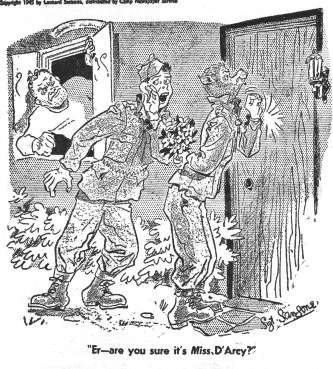
|
In the March issue of Fortune Magazine the above question was dealt with; here is what the results show: Could Germany become a good nation within 20 years after the war? 21.8% said yes, 37% said it would take longer, 30.6% said Germany never could become a good nation, 10.6% were undecided.
As to the ways in which Germany may be treated after her defeat: Abolition of the Nazi Party was approved by 93 percent, 85.7 percent approved of complete demobilization of the German army and preventing of Germans having any arms again, 85.5 percent of the people favor the proposal of an occupying force for several years in Germany.
40.5 percent of the citizens of the United States want to break Germany up into small states, 43 percent want to prevent Germany from building her steel, chemical and automotive industries again after the war. More than three out of five of us are in favor of making Germ,an labor rebuild the devastated areas in other countries at the usual rate paid war prisoners.
How do we feel about Germany becoming a member of a world organization after the war? 64.9 percent favor Germany's admission after she has proved her worth, 19.4 percent believe she should never be admitted, 8.3 percent believe she should be admitted right away.
These expressions of opinion concur with the general hopes expressed by the Crimean Conference and show that the American people believe Germany can be redeemed for civilized living under firm long-term United Nations control. - JFC
ELECTRIC, SEXY AND THREE-CURVE LEGS
Do you like girls with three-curve legs?
Frankly, it had never occurred to us to diagnose women's legs along this line - legs were always either nice, or they weren't - but along came a girl named Leora Thompson who said three-curve legs are the very best.
At the same time, Miss Thompson, who is an artists' representative, spoke of legs with character. And she blossomed forth with a list of the ten pairs of U.S. feminine legs which have the most character. Here they are:
Sexy, Mary Howard; luscious, Ann Miller; exuberant, Elsa Maxwell; adventurous, Martha Tilton; provocative, Mrs. Donald Novis; carefree, Martha Scott; sophisticated, Evelyn Ankers; tenacious, Madame Frances Perkins; electric, Carole Landis; and daring, Lily Pons.
Mary Howard, said Miss Thompson, is the only girl she knows who has three-curve legs. And what are these curves? "Well," she said, "the one along the thigh, the one in the calf, and a v-e-r-y subtle little curve just below the knee on the outside."
How do you feel men? Adventurous? Electric? Sexy?
BE SECURITY CONSCIOUS
Enemy espionage agents are continually attempting to learn information of Allied military activities and plans - more so in this theater than in any other. Becaise the Jap is fighting a losing war he has redoubled his efforts to illicit information from both civilian and military personnel.
It is the duty of all personnel of the Bengal Air Depot to not only be constantly alert against talking about military operations and plans but to report all persons who show interest in their military activities.
Most counter-intelligence agents of the Allied forces are known to the enemy - and they are avoided. Thus, the success of the investigating agencies depend on the information given it by those it serves - you.
If you see or hear anything that seems the least bit out of the ordinary report it to the Intelligence Office immediately. Be careful - be watchful of the men or women who try to elicit even insignificant information by flattery, argument, sex, belittling our country or the war effort, gifts, sympathetic understanding of your troubles, impressing you with their importance or a knowledge greater than yours of what is "cookin'."
When you report an incident do so as quickly and in as much detail as possible. Nine-tenths of the success of an investigation depends on the original information - WHO, WHEN, WHAT, WHERE.

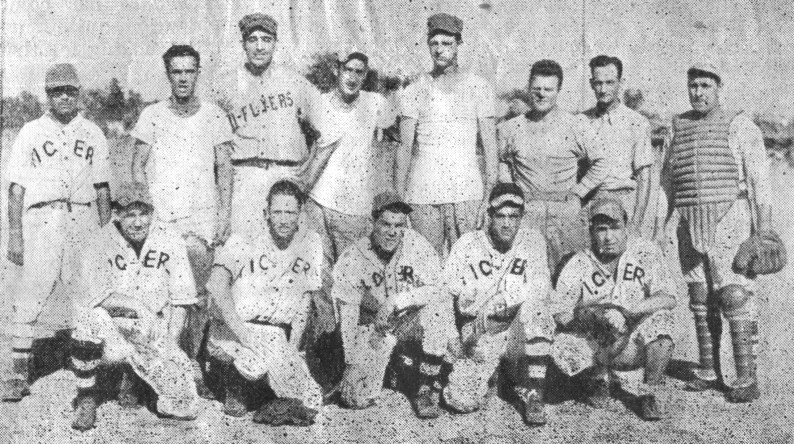 The Rebels, talented baseball champions of the Bengal Air Depot.
By thumping out a convincing 10-4 victory over the Blue Devils Sunday in the last game of the schedule they achieved Depot fame.
Standing, left to right: Tony Perea SS, Jimmy Higgins CF, Chester Redmon P, Dickey Wellborn, Ernie Martin 1B, Ted Boese (Blue Devils SS who posed with the champs), Charles Thompson MGR, Bert Lightner C.
Kneeling: Ed Kilgore RF, Sherman McLam 3B, Henry Daveau 2B, Alonzo Fulmer LF, Jimmy Barr LF.
The Rebels, talented baseball champions of the Bengal Air Depot.
By thumping out a convincing 10-4 victory over the Blue Devils Sunday in the last game of the schedule they achieved Depot fame.
Standing, left to right: Tony Perea SS, Jimmy Higgins CF, Chester Redmon P, Dickey Wellborn, Ernie Martin 1B, Ted Boese (Blue Devils SS who posed with the champs), Charles Thompson MGR, Bert Lightner C.
Kneeling: Ed Kilgore RF, Sherman McLam 3B, Henry Daveau 2B, Alonzo Fulmer LF, Jimmy Barr LF.
|
Redmon Hurls Rebels To 10-4 Win Over Devils; Martin, Boese Homer
While several hundred GIs craned their necks to see, the Rebels won the baseball championship of the Depot Sunday afternoon under a sweltering sky by humbling the Blue Devils, 10-4. Spearheaded by the fine hurling of Chester Redmon and the hitting of Ernie Martin the Rebels applied the crusher to a close game by tallying four runs in the seventh on errors and Martin's long home run over the wire barrier in dead right field.
Loosely played and drab from a non-partisan spectator's view point, the game did provide some interesting fielding plays.
The Rebels leaped off to a two run lead in the first when a walk, two hits and an error were put together. Higgins opened the game by drawing a walk but he was tagged out when he overran second on an attempted steal. There were two away when Wise passed Fulmer. With Daveau at bat Fulmer took off for second base. Smith's high throw went through Boese and enabled Fulmer to race home with the first run. Daveau dumped a texas Leaguer in right and advanced to second when Wise tossed badly trying to pick him off. Martin reached out for a pitch after Lightner walked and smashed it between third and short to tally Daveau. McLam grounded out to end the uprising.
The Blue Devils blasted back in their half of the first with three runs to take the lead. barto singled through third after Talaga had struck out. Coppola drew a walk off Redmon to put two on. Ted boese picked on the first pitch and slammed it to deep right, over the barricade, for a homer and three runs.
REBELS REGAIN LEAD
| |||||||||||||||||||||||||||||||||||||||||||||||||||||||||||||||||||||||||||||||||||||||||||||||||||||||||||||||||||||||||||||||||||||||
Three hits in the fourth increased the Rebels' score to six runs. With one down Higgins singled to left. Perea drove a sharp hit over second to chase Higgins to third. Fulmer bunted and on a delayed steal Higgins dashed home. Deveau's single tallied Perea. Daveau tried to make second on the hit but Henry's throw to Talaga nipped him.
The Blue Devils fell before big Redmon's offerings four innings in a row after Boese's homer in the first but they converted a single into their fourth run in the sixth. Coppola laced a hit past third but Boese forced him. The relay from Perea was wild and Boese raced to second. he stole third and dashed home after Armich's fly ball to center was caught.
The game was still close when the Rebels opened the seventh but it wasn't after they'd taken their cuts. Fulmer made second when Armich dropped his high fly with one out. Wise couldn't make up his mind where to throw Daveau's grounder until too late, to put Fullmer on third. Lightner pounded what was apparently a double-play ball to short but after Boese had kicked at second and tossed badly to first the umpire announced that Boese had not tagged second - both men were safe. Devil supporters howled at the decision and the irate players argued but the umpire was adamant. Fulmer had scored on the play as did Daveau. Wise kicked dirt on the mound when play resumed - but he kicked more when Ernie Martin selected a fast pitch and drove it on a line into dead right field for a homer, bringing the count to 10-4. Redmon set the Blue Devils down in order in the last of the seventh to end the game.
POST MORTEMS: The standout fielding play was Martin'e stab of Joe Talaga's liner over first in the fifth... calmly chewing the big wad of tobacco, Ernie gauged the speed of the hard hit ball, its height and the instant it reached his position, leaped into the air and speared the ball in his glove... it would have been a sure double. Ted Boese sparkled at short as usual... his dash and scoop of a grounder early in the game was a gem - but the perfect throw to first while off balance was an eye-opener. Just before martin's play in the fifth, Wise had belted a pitch over the fence on a bounce for a ground rule double... when Redmon whirled and threw to pick him off the throw went into centerfield... Higgins scooped up the ball and shot it to McLam, who waited for Wise and tagged him easily. Stud Kilgore was almost brained by Armich's fly ball in the fourth... the wind caused the ball to waver as it came down - with Kilgore wavering even more... he caught the ball at the last moment - to even his admitted surprise.
SAD SACKS, GINHOUNDS, TIGERS, BOMBS, REBELS UNDEFEATED IN SOFTBALL
After two weeks' play, as of Tuesday, the leading teams in the National League are the Sad Sacks, Ginhounds and Tigers with two straight victories while the Flame Bombs and Rebels have the same record in the American League. The Supply team in the latter league has scored 4 victories but dropped a 6-0 verdict to the Rebels. The closest game to date was the 1-0 decision Signal Stock eked out over Ordnance while the Rebels really turned it on to drub MPs 41-1.
Because of the larger number of entries the EM Council decided to have two leagues. At the end of the season the four top teams in each league will meet in a playoff to determine the Depot Champions. This may be a great help to some of the teams that have gotten off to a poor start who by finding themselves may edge into the playoff and grab off the title.
Falcons Take Second Straight, 8 - 1
Hitting the ball when most needed and otherwise playing bang-up softball the Falcons scored their second straight win Sunday behind the three-hit pitching of Frank Kozeliski. The final score read 8-1. Again the entire club played a hustling brand of ball that stamps them as a definite threat to enter the play-offs.
In the hits department, LaChapelle took the honors with three safeties in four attempts. In the seventh inning the same LaChapelle, playing shortstop for the Falcons, made a spectacular one-handed catch of a line drive over his post. It was easily one of the nicest plays of the season. Joining LaChapelle in fielding honors was back-stopper Harley Young who threw out three would-be bas stealers with his powerful throwing arm.
Falcons Take Another, 3 - 0
Skipper Cholly Long's Falcons continued their winning ways Wednesday afternoon by defeating the Flying Tyres 3-0 in a softball game that featured the two hit pitching of Frank Kozeliski. Coasting to his third straight victory kozeliski was backed by capable fielding. Fleet-footed shortfielder Wood continued his hitting streak with two hits in three tries. Hardy also garnered two safeties.
Lawrence Loses 3-Round Bout
In a fast-paced slugfest S/Sgt. Earl J. Lawrence, local welterweight, was given his first setback in four starts. More than five thousand fans saw Floyd Johnson, lean, rangy fighter from up country, get the nod over Lawrence in a three-round bout at the Calcutta Footbal Stadium last Wednesday evening.
Weighing in at 143 to his opponent's 145, the local boy was at a decided disadvantage against superior reach, more than a head in height and extensive ring experience. Lawrence isn't discouraged, however. With more ring :know-how" and further development of what promises to be a very beautiful right cross, it is our opinion he will bang through for many more victories.
The first round was lightning fast. Leather flew in all directions and the crowd ate it up. We score that one fifty-fifty. The second was a bit slower, the boys feeling out each other. The crab-like stance Johnson adopted seemed to stop Lawrence for a while and it was not until the final go that he was able to penetrate it. He landed some very nice lefts then, rocking the taller man several times. But Johnson had piled up the points with his swift punches flung from various angles out of that peculiar stance.
On March 11 Sgt. lawrence defeated Cpl. Cromwell in a three rounder. His record now reads three wins; one loss.
Nine bouts constituted the card. Main event was five rounds: Claude Talbert, 159, vs. popular Ernie Copeland, 151, Camp H. Ernie's flashing left tied the other boy up. The judges were unanimous in their choice of Copeland.
Cpl. Ken Ashley, RAF, decisioned Ray Miles in a fast-stepping, hard punching three round lightweight match.
Ellis Jackson, 170, in a rematch with powerfully built, up-country Lester Yantze, 171, slugged his way to a three round win.
George Holt, 126, up-country, lost to John Kent, 120, British, when an elbow injury prevented his answering the fourth round bell in a scheduled five rounder.
Bill McLaughlin, Camp H heavy, defeated Bill Sites, Hospital, rather easily in their three round match.
Ernie Nicholls, welter, and George Brooks, lightweight, Camp H, were winners of their opening bouts. - Ed Baker
Depot Table Tennis Team 1st Half Champs
The Depot Table Tennis team was victorious in the first half of the league coming through undefeated. The second round commenced early this week without the services of Cpl. Bob Perdue, recently transferred. He will be replaced by Sgt. harold Wolf of a Repair outfit. Joachim, Curthoys, Rosen, Knazen, Chinn and another new man, Boyce, will start the second half. two other Depot teams have joined the league, Ordnance and the Officers.
The first half champs have secured a new Stateside table and are now trying to obtain permission for the use of 200 watt bulbs for their matches at Rajah's Rest.
Northrup Only Singles Net Man
Three participants from the Depot were still right in there after the first round of the All American Tennis Tournament being held in Our Town. T/Sgt. Norman E. Northrup, Depot Champion, breezed through his first singles match 6-0, 6-1, while Air Corps Supply's Maj. John Reindel copped his singles 6-0, 5-7, 6-3. Sgt. Joe Frame and Lt. Bishop Holstein lost their singles matches in close games. Major Reindel and Lt. Holstein won their doubles match turning in a blazing 6-0, 6-2. Finals of the tourney will be held tomorrow afternoon.
Flash: On Wednesday night only Northrup remained in the singles.

THE TIGER RAG is a weekly publication edited and written by and for the Enlisted Personnel and Officers of APO 492, and is under the direction of the Commanding General, Brigadier General Frank D. Hackett and Public Relations Officer, Major Edward B. Dixson. STAFF: EDITOR... Cpl. William A. Frank; ASSOCIATE EDITOR... Pfc. Art Goldberg; FEATURES... Sgt. Robert J. McCarty; ART... Cpl. Layton H. Wicksten; PHOTOGRAPHY... Base Lab. Statements or policies reflected through the columns of this publication under no circumstances are to be considered those of the United States Army. Articles submitted by Officers and Enlisted Men represent personal opinions only.

MARCH 24, 1945
Copyright © 2015 Carl Warren Weidenburner
ABOUT TIGER RAG E-MAIL YOUR COMMENTS MORE TIGER RAG
TOP OF PAGE CLOSE THIS WINDOW